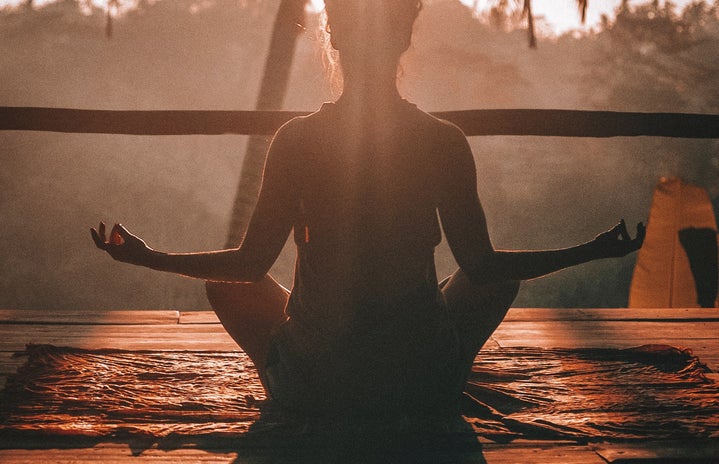Please note: This article contains a discussion of mental health disorders, specifically dealing with anxiety, which may act as triggers. Continue at your own discretion.
Do you rehearse your lines in your head when everyone is asked to introduce themselves? Do you dread making phone calls? Do you avoid complaining when you’re given the wrong food order? Do you replay social interactions in your head and worry about what the person may have thought about you? I can relate to all these and more. During orientation week in MHC, we were asked to introduce ourselves more times than I can count. Every single time, I would rehearse my lines in my head hoping not to mess up in my turn like it was a do-or-die affair. Being on a college campus definitely forces you to put yourself out there in ways you have never had to. From sharing a room, using a dining hall, having classes that require participation, and being in big student groups, it’s very easy to become overwhelmed. It’s like the environment, the world honestly, is created for extroverts to thrive, while those who have anxiety or prefer solitude find it very hard to manage.
Social Anxiety vs Introversion
A simple google search will explain what social anxiety is. So I’ll tell you what it’s not. It’s not introversion. It’s not being shy. It’s not being quiet. It’s a legitimate mental condition that stems from “extreme fear of being scrutinized and judged by others in social or performance situations,” according to the Anxiety and Depression Association of America (ADAA). (source) Introversion is personality-based. It’s not something you can really change. Of course, you can improve your social skills and become more comfortable with groups. But the main source of energy, which is solitude, isn’t something you can ever change. While introverts may prefer solitude, people with social anxiety may actually want to join the party or discussion but are held back due to the possibility of rejection.
No judgment to people who get the differences twisted up. I’ve actually been trying to decide if I’m simply an introvert or if I have social anxiety. To be honest, as much research as I’ve done, the signs I have seem to resonate for both. Forget about the neatly detailed terms and instead focus on you. How do you feel in social situations: fear or tiredness? Do you feel better when being alone or do you prefer to be alone because you’re afraid of being with people? When you figure out the “How” you have to do the hard part and discover the “Why.” Here are healthy ways to deal with anxiety:
- Therapy: The counseling services in MHC are very helpful in guiding students to discover what’s best suited for their mental health. When I first went in for a session, I was a little scared. Am I supposed to be here? I don’t really think anything is wrong with me. These were all thoughts swarming around my head. But it was very relaxed and we just talked. To have someone actively listen to you is an amazing feeling. I should add this: don’t self-diagnose. You unknowingly start acting like you have the symptoms of whatever you diagnose yourself with and this is dangerous for mental health conditions. Let a trained specialist do that for you.
- Pay attention to your relationship with alcohol: Again, no judgement here. There is nothing wrong with having drinks for fun at a party, it’s college. But if you start needing alcohol to socialize and have fun, get help. It shouldn’t be used as a clutch to help you navigate anxiety-ridden situations.
- Exercise: Anxiety is more than just a state of mind, it’s almost like frenetic energy. Relieving this energy through physical activities like exercise. If lifting weights isn’t your thing, yoga or practicing mindfulness are other ways. The goal is to cope with anxiety in healthy ways. These are ways I’ve found that help me cope with my anxiety because it keeps me grounded. Also, you get to make a lot of friends at the gym so two birds with one stone?
- Family: It’s hard to talk to some parents about mental health. For me, my anxiety is also rooted in the fact that I’m away from all familial cues. So I call home every week and talk to my mom and my siblings. Connecting with familiar people is a nice fuzzy feeling. You don’t need to tell them about your mental health, especially if they don’t understand. Just call and chat about life at home or whatever their day is like.
- Journaling: I hate journaling. Well, I did. I honestly didn’t see the point when my therapist recommended this. Why do I need to record all my emotions on a piece of paper? Then there was also the possibility of my roommate finding it and going through it. My answer to that last part was journal apps. Besides, I type faster than I write. You don’t even need a specific app, your notes app can work too. This way you can put a lock on them and be sure no one else can read them. Journaling gives me the same freeing feeling I get after I tell someone about my stress or anxiety. It’s like a weight lifted off my shoulder.
There are many ways to cope with social anxiety and these are just specific to me. Remember to find what works for you and don’t try to fit into any boxes. Focus solely on your feelings, be selfish with your mental health!
If you would like to write for Her Campus Mount Holyoke, or if you have any questions or comments for us, please email hc.mtholyoke@hercampus.com.


